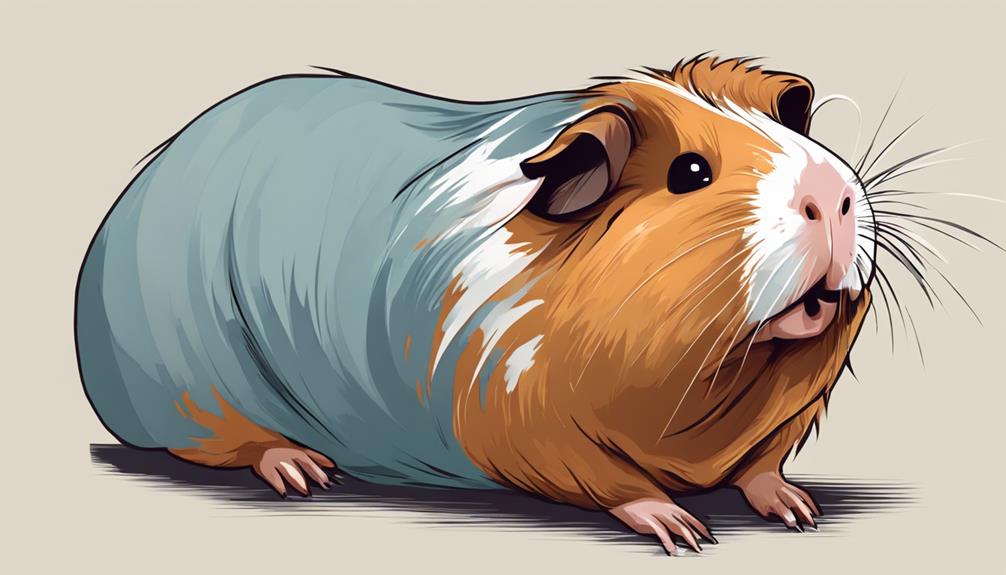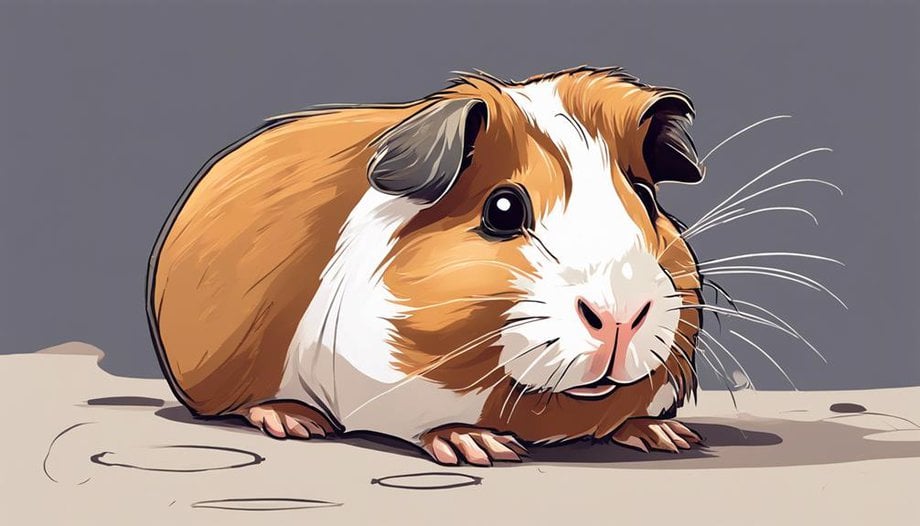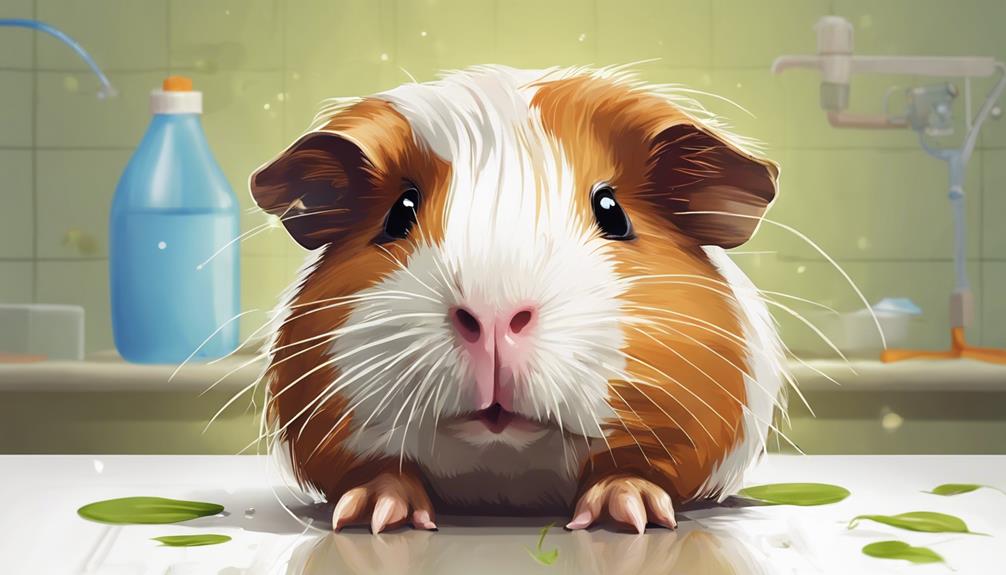What Are Common Respiratory Infections in Guinea Pigs?

Common Respiratory Infections in Guinea Pigs:
Upper respiratory infections and pneumonia are prevalent respiratory ailments in guinea pigs, impacting their overall well-being.
Understanding these conditions is crucial for ensuring the health and harmony of these delicate creatures.
Key Takeaways
- Upper respiratory infections are common in guinea pigs due to environmental stressors and poor ventilation.
- Prompt veterinary care and antibiotics are crucial for treating pneumonia and Bordetella infections.
- Streptococcal infections in guinea pigs require immediate antibiotics and hygiene upkeep for prevention.
- Prevention strategies include clean living environments, proper ventilation, balanced diets, and regular check-ups.
Upper Respiratory Infections
Experiencing symptoms such as sneezing, nasal discharge, and wheezing, guinea pigs may be afflicted by upper respiratory infections. These delicate creatures are susceptible to such ailments due to various factors, including environmental stressors, poor ventilation, and exposure to sick animals.
To prevent these infections, ensuring a clean living environment, providing proper ventilation, and minimizing contact with other sick pets are essential steps. Additionally, maintaining best humidity levels and avoiding drafts can greatly reduce the risk of respiratory issues in guinea pigs.
Should a guinea pig fall prey to an upper respiratory infection, prompt treatment is important. Consulting a veterinarian for a proper diagnosis and treatment plan is paramount. Antibiotics may be prescribed to combat bacterial infections, while supportive care such as ensuring adequate hydration and a balanced diet can aid in recovery.
Regular health check-ups and swift intervention at the first sign of symptoms play a crucial role in managing and preventing upper respiratory infections in these beloved pets.
Pneumonia
In guinea pigs, upper respiratory infections left untreated can sometimes progress to pneumonia, a more severe respiratory condition requiring immediate veterinary attention. Pneumonia in guinea pigs can be a life-threatening condition, and prompt intervention is important to guarantee the well-being of these small creatures.
4 Essential Points for Dealing with Pneumonia in Guinea Pigs:
- Early Recognition: Recognizing the signs of pneumonia early on, such as labored breathing or nasal discharge, is essential for timely treatment.
- Veterinary Care: Seeking veterinary care promptly is crucial when pneumonia is suspected in a guinea pig to prevent the condition from worsening.
- Respiratory Therapy: Providing proper respiratory therapy as prescribed by a veterinarian can help alleviate symptoms and support the guinea pig's recovery.
- Pneumonia Prevention: Maintaining a clean living environment, avoiding drafts, and ensuring proper nutrition are key factors in preventing respiratory infections that could lead to pneumonia in guinea pigs.
Bordetella Infection

Bordetella infection in guinea pigs can manifest through various symptoms, including sneezing, nasal discharge, and difficulty breathing. It's important for owners to seek veterinary care promptly to explore treatment options such as antibiotics and supportive care.
Implementing preventive measures, such as maintaining good hygiene and minimizing stress, can help safeguard guinea pigs from contracting Bordetella infections.
Symptoms of Bordetella
When a guinea pig is infected with Bordetella, it may exhibit a range of respiratory symptoms. These symptoms can vary in severity and may include:
- Persistent coughing, often described as honking or wheezing.
- Nasal discharge, which can be clear or purulent.
- Labored breathing or rapid, shallow breaths.
- Reduced appetite and lethargy, indicating overall discomfort.
Recognizing these signs promptly is essential for seeking appropriate care. Guinea pigs with Bordetella infection may require treatment options or home remedies to alleviate their symptoms effectively. Understanding the prognosis and recovery time for these cases can help caretakers provide the best support and care for their beloved pets.
Treatment Options Available
For those caring for guinea pigs affected by Bordetella, a variety of treatment options are available to alleviate respiratory symptoms effectively.
Prompt intervention plays a critical role in combating respiratory infections in these delicate creatures. Respiratory infection treatments may include antibiotics prescribed by a knowledgeable veterinarian to target the specific bacterial strain causing the illness.
Additionally, holistic options like steam therapy or nebulization with saline solutions can help soothe respiratory distress. Ensuring a comfortable environment with adequate ventilation and cleanliness is paramount in supporting the recovery process.
Owners must closely monitor their guinea pigs' progress and consult with a veterinary professional at the first sign of respiratory issues. By prioritizing early intervention and exploring diverse treatment modalities, one can provide the best care for guinea pigs battling Bordetella.
Prevention Measures Recommended
To safeguard guinea pigs from Bordetella infections, conscientious attention to hygiene practices and regular veterinary check-ups is paramount. Guinea pig health and wellness are of utmost importance when considering respiratory infection management and prevention.
Here are four essential prevention measures recommended for protecting guinea pigs from Bordetella infections:
- Clean Living Environment: Regularly clean cages and bedding to reduce the risk of bacterial buildup.
- Guarantee Good Ventilation: Guarantee good airflow in the guinea pig's living space to prevent the spread of respiratory pathogens.
- Isolate New Guinea Pigs: Isolate new guinea pigs before introducing them to the existing herd to prevent potential infections.
- Healthy Diet and Exercise: Provide a balanced diet and opportunities for exercise to boost the guinea pigs' immune system and overall wellness.
Streptococcal Infection

Streptococcal infection can manifest in guinea pigs with various symptoms, including respiratory distress and nasal discharge.
Treatment options such as antibiotics may be prescribed by a veterinarian to combat the infection effectively.
Implementing preventive measures, like maintaining good hygiene and minimizing stress, is essential in safeguarding guinea pigs from contracting this respiratory illness.
Streptococcal Infection Symptoms
Among the common symptoms of this bacterial infection are respiratory distress, fever, and lethargy, indicating the severity of the streptococcal infection in guinea pigs. When a guinea pig presents with these signs, it's important to act promptly to alleviate their suffering.
To better understand the impact of streptococcal infections, consider the following:
- Respiratory Distress: Guinea pigs may exhibit labored breathing or wheezing, signaling compromised respiratory function.
- Fever: Elevated body temperature can indicate an active immune response to the infection.
- Lethargy: A lack of energy or interest in usual activities suggests the body is fighting the infection.
- Seek Veterinary Care: Immediate attention from a veterinarian can help in diagnosing and treating streptococcal infections effectively.
Treatment Options Available
Veterinarians typically recommend a course of antibiotics to effectively combat streptococcal infections in guinea pigs. These medications play an important role in eradicating the harmful bacteria responsible for the infection. Common antibiotic options include penicillin, amoxicillin, or tetracycline, which are prescribed based on the severity of the infection.
It's important to administer the full course of antibiotics as prescribed by the veterinarian to make sure the infection is completely eliminated. In addition to conventional medication options, some guinea pig owners opt for herbal remedies to complement the treatment process. While herbal remedies may offer some benefits, it's important to consult with a vet before incorporating them into the guinea pig's treatment plan to make sure they're safe and effective.
Prevention Measures for Guinea Pigs
To safeguard guinea pigs from streptococcal infections, conscientious owners prioritize maintaining a clean and hygienic living environment for their beloved pets. Here are essential prevention measures to guarantee the well-being of guinea pigs:
- Diet Management: Providing a balanced diet rich in vitamin C can boost their immune system and help fight off infections.
- Environmental Enrichment: Creating a stimulating environment with toys, hiding spots, and social interaction can reduce stress and enhance their overall health.
- Vitamin Supplementation: Administering vitamin supplements as prescribed by a veterinarian can address any deficiencies and support their immune function.
- Regular Check-ups: Scheduling routine veterinary visits allows for early detection of any potential health issues and ensures timely intervention to prevent infections from escalating.
Mycoplasma Infection

Mycoplasma infection, a common respiratory ailment in guinea pigs, can lead to serious health complications if left untreated. It's essential for caregivers to understand the modes of transmission and effective prevention strategies to safeguard the well-being of these beloved pets. Mycoplasma can spread through direct contact between infected and healthy guinea pigs, emphasizing the importance of quarantine measures for new additions to the group. Additionally, ensuring proper ventilation and maintaining a clean living environment can greatly reduce the risk of infection.
One concerning aspect of Mycoplasma infection is its potential for antibiotic resistance. This poses a challenge in treatment, highlighting the necessity of early detection and prompt intervention. Veterinarians may recommend specific antibiotics based on the strain and severity of the infection, underscoring the importance of professional guidance in managing Mycoplasma in guinea pigs. By staying vigilant, implementing preventive measures, and seeking timely veterinary care, caregivers can effectively combat Mycoplasma infections and uphold the health and happiness of their furry companions.
Influenza Virus
The intricate web of respiratory infections in guinea pigs unravels further with the looming threat of the Influenza Virus. This highly contagious virus poses a significant risk to our furry friends, emphasizing the importance of understanding its nuances.
- Vaccine development: Researchers are continually endeavoring to develop effective vaccines to protect guinea pigs from influenza, a pivotal step in preventing outbreaks in these delicate creatures.
- Transmission routes: Guinea pigs can contract the Influenza Virus through various routes, including direct contact with infected individuals or exposure to contaminated environments.
- Preventive measures: Implementing strict biosecurity protocols and ensuring proper hygiene practices can help reduce the risk of influenza transmission among guinea pigs.
- Vigilance and monitoring: Regular health check-ups and prompt isolation of sick animals are essential in controlling the spread of the Influenza Virus within guinea pig populations.
Fungal Respiratory Infections

In the domain of guinea pig health, fungal respiratory infections present a formidable challenge that demands careful attention and proactive measures. These infections can be caused by various types of fungi, with symptoms ranging from sneezing and nasal discharge to more severe respiratory distress. Understanding the risk factors and treatment options is important for maintaining the respiratory health of guinea pigs.
To explore further into this topic, let's examine a concise table highlighting key aspects of fungal respiratory infections in guinea pigs:
| Aspect | Description |
|---|---|
| Fungal Spore Transmission | Airborne spores from hay and bedding |
| Treatment Options | Antifungal medications, veterinary care |
| Environmental Risk Factors | Poor ventilation, damp living conditions |
| Respiratory Health | Regular cleaning, low-stress environment |
Allergic Respiratory Reactions
Allergic respiratory reactions in guinea pigs can manifest as a result of sensitivities to various environmental factors, impacting their respiratory health greatly. These reactions can lead to respiratory distress and discomfort in these small, delicate creatures. To guarantee the well-being of guinea pigs, it's essential to understand the triggers and manage them effectively.
Identifying Triggers: Recognizing environmental factors such as dust, pollen, or certain bedding materials that may cause allergic reactions is vital.
Preventive Measures: Implementing strategies to minimize exposure to known allergens can greatly improve the respiratory health of guinea pigs.
Consulting a Veterinarian: Seeking professional advice is paramount if a guinea pig shows signs of respiratory distress or allergic reactions.
Regular Monitoring: Observing guinea pigs closely for any changes in their breathing patterns or behaviors can aid in early detection of potential allergic respiratory issues.
Frequently Asked Questions
Can Guinea Pigs Transmit Respiratory Infections to Humans?
Respiratory infections in guinea pigs can pose zoonotic risks. While rare, transmission to humans is possible. If a guinea pig exhibits respiratory symptoms, prompt diagnosis is essential. Always consult a veterinarian to address concerns.
Are There Any Preventative Measures to Reduce the Risk of Respiratory Infections in Guinea Pigs?
To reduce the risk of respiratory infections in guinea pigs, it's crucial to focus on environmental factors and hygiene practices. Ensuring a clean living space, proper ventilation, and a balanced diet with dietary supplements can promote their overall health.
How Long Does It Typically Take for a Guinea Pig to Recover From a Respiratory Infection?
When a guinea pig is recovering from a respiratory infection, the timeline can vary depending on the severity and treatment. With proper care and treatment, most guinea pigs show improvement within a week, regaining their usual behavior and appetite.
Are There Any Specific Breeds of Guinea Pigs That Are More Prone to Respiratory Infections?
Some guinea pig breeds, like the Abyssinian or the Silkie, may have genetic predispositions that make them more prone to respiratory infections. However, environmental factors, such as proper ventilation and cleanliness, also play an important role.
Can Respiratory Infections in Guinea Pigs Be Treated at Home, or Is Professional Veterinary Care Always Necessary?
When dealing with guinea pigs' respiratory infections, home remedies may offer some relief, but professional veterinary care is often essential. Prompt treatment options can aid in a guinea pig's recovery and prevent potential complications.










